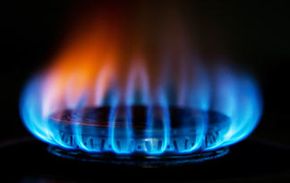Key Takeaways
- Natural gas is a nonrenewable fossil fuel primarily made of methane and used widely for cooking, heating and electricity, due to its abundance and relatively low cost.
- It burns cleaner than other fossil fuels, emitting fewer harmful emissions.
- Despite its benefits, the extraction process raises environmental concerns.
When people talk about energy and natural gas, opinions differ. Is it harmful to the environment, or the last great clean energy source? Perhaps we shouldn't ask whether natural gas is a good source of energy, but instead examine what makes a good energy source in the first place.
So what is natural gas, anyway? Natural gas, like oil and coal, is a fossil fuel, formed deep below the surface of the earth. Scientists believe that natural gas, much like oil, formed millions of years ago when the remains of ancient plants and animals broke down under pressure and heat. The decaying matter formed gas, which got trapped in porous rocks in areas that were later covered with harder rocks.
Advertisement
Natural gas is primarily made of methane, the lightest hydrocarbon (a compound of hydrogen and carbon). Natural gas has no color or odor. When it’s burned, it gives off a lot of energy that can be used for cooking, heating, generating electricity and other necessities. However, because it’s a fossil fuel, natural gas isn't a renewable resource. It's a good source of energy today; after all, there's plenty of it in the United States. If that wasn't enough, it can be produced and transported affordably.
Natural gas is often praised as a clean energy alternative. It burns more cleanly than other fossil fuels, emitting lower levels of harmful emissions such as carbon monoxide, carbon dioxide and nitrous oxides. It produces less greenhouse gases than other fossil fuels do. It doesn't produce ash or particulates that cause health problems. It’s not as clean as renewable energy sources such as wind or solar, but because it’s abundant, relatively inexpensive and easy to use, many consider it a stop-gap measure as society makes the transition to other energy sources.
Some critics say, however, that natural gas isn’t as clean as it seems. Some scientists say that even though natural gas burns more cleanly than other fossil fuels, a significant amount of methane escapes into the atmosphere from natural gas wells and pipelines. Methane is one of the major greenhouse gases that trap heat in the earth’s atmosphere. Newer methods of mining natural gas from harder rocks and deeper deposits are controversial, especially hydraulic fracturing, or fracking. In fracking, high pressure is used to force fluids underground to break shale rocks and get deep deposits of natural gas. Critics say the process emits methane and pollutes water supplies.
There is some middle ground between these two trains of thought, however. Pipelines carry natural gas around the United States and many other parts of the world. This can be an environmental boondoggle, but liquefied natural gas (LNG) provides a way to store and ship natural gas economically -- and without pipelines. Natural gas is liquefied by cooling it and removing most of the compounds in it other than methane. It becomes a liquid that weighs about half as much as water and takes up much less space than the equivalent natural gas. When gas is needed, the LNG is warmed until it’s gaseous again.
Opinions tend to run the gamut on natural gas and the cleanest ways to use it, but most can agree that it's eco-friendly -- but flawed -- energy source.
Advertisement

